Scores Killed, Injured In Attack On Iran Convoy In Syria: Media
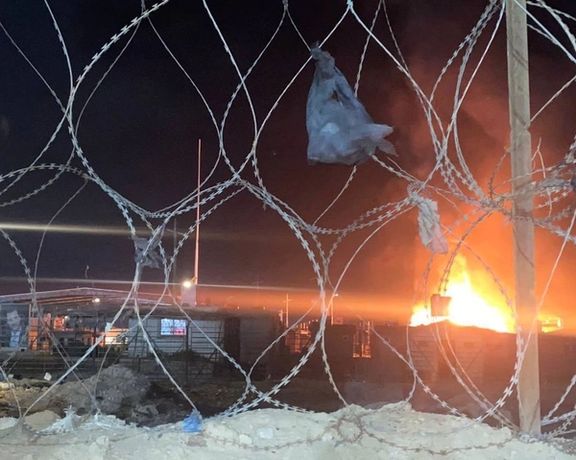
Iran’s state broadcaster reported that “a US drone” attacked a convoy of 22 tankers near the Iraqi Syrian border Tuesday night, while others report high casualties

Iran’s state broadcaster reported that “a US drone” attacked a convoy of 22 tankers near the Iraqi Syrian border Tuesday night, while others report high casualties
The source says eight tankers were targeted and two of them caught fire, forcing the convoy to stop moving. However, Iran claims still 14 tankers are in the Iraqi territory.
Iran's state broadcaster had earlier announced that American warplanes had launched airstrikes against a convoy carrying logistics along the Iraqi-Syrian border.
Sabereen News, which is affiliated with the Revolutionary Guard says 25 fighters have been killed and 21 others injured so far but provided no details about the nationality of the military personnel. It says the fuel shipment was supposed to be delivered to Lebanon.
According to AFP, a spokeswoman for the US-led coalitionfighting the remnants of the ISIS in Iraq and Syria said that the strike was not carried out by the United States or any other coalition country.
Meanwhile, the UK-based Syrian Observatory for Human Rights stated the strike hit a convoy of “fuel tankers and trucks loaded with weapons and most of those killed were militiamen.”
Pro-Iran militias have long been present near the Iraq-Syria border in Deir ez-Zor province and for several times Iran and the US launched reciprocal attacks there.
The strike comes a day after a US citizen, Stephen Edward Troell, was killed in Baghdad. No group claimed responsibility for the killing but Iraqi Prime Minister Mohammed Shia’ al-Sudani on Monday ordered an investigation. The US embassy in Baghdad confirmed Troell’s death, adding that they were closely monitoring the investigation.
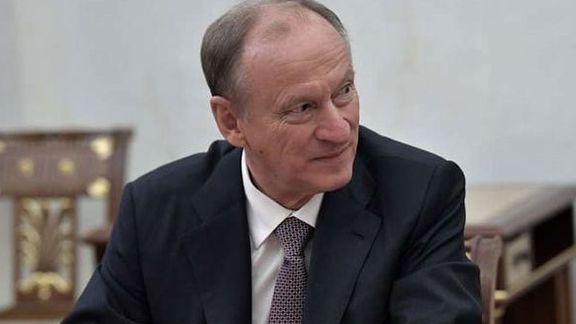
Russia’s national security chief visiting Iran discussed Ukraine and ways to combat "Western interference" in their internal affairs with his Iranian counterpart.
Russia's Security Council Secretary Nikolai Patrushev, a close ally of President Vladimir Putin met with Ali Shamkhani, the secretary of Iran's Supreme National Security Council, Russian state news agencies said.
Nour News Agency, affiliated with the Iranian Supreme National Security Council (SNSC), announced in an English tweet that Patrushev was invited by Shamkhani, adding that he will also hold meetings with other high-ranking Iranians to discuss cooperation between Tehran and Moscow.
Alongside Ukraine, the two discussed "information security, as well as measures to counter interference in the internal affairs of both countries by Western special services," the TASS news agency reported, citing a readout from the Russian Security Council press service.
"The economic potential of Russia and Iran and building foreign trade relations in the face of sanctions pressure was emphasized," it added.
Patrushev’s trip to Iran has raised considerable speculations that he might discuss the sale of Iranian ballistic missiles to Russia, which has already used Iranian suicide drones in Ukraine against civilian targets.
The Islamic Republic on Saturday finally admitted it has provided drones to Russia claiming that they were supplied months before the Ukrainian war.
Foreign Minister Hossein Amir-Abdollahian said Tehran provided Moscow with a limited number of drones months before the war, but if it is proven that Russia has used them against Ukraine, the Islamic Republic will not be indifferent to it.
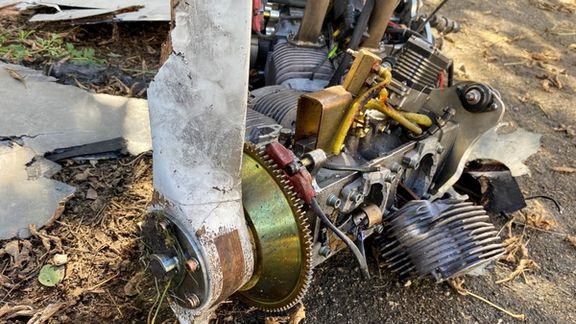
After 18 months of talks to revive the JCPOA, an Obama-era nuclear accord with the United States, Iran presented demands in August that were unacceptable to Washington and negotiations broke down. Already in July the US had announced that Iran was preparing to supply drones to Russia.
Petrushev’s visit comes amid some criticism in Tehran of military aid to Moscow. The well-known conservative editor of a government newspaper asked the government on Monday why it did not ban Russia from using Iranian drones against Ukraine. Massih Mohajeri, the editor of Jomhouri Eslami (Islamic Republic) newspaper said the government must admit its mistake.
Some believe Iran publicly announced Patrushev’s arrival in Tehran to tell the world that the mutual ties between the Islamic Republic and Russia is deepening, and implicitly emphasize that a powerful Russian official turned to Iran for help in Ukraine.
However, the clerical regime is likely to boast of its strategic relations with Russia, signaling to its regional adversaries that the Kremlin is a constant powerful ally, although in fact it faces a possible defeat in Ukraine, with its military reputation in tatters.
Some others speculate the Iranian autocratic rulers are seeking Russian assistance to suppress the antigovernment protests that have swept the country since mid-September.
Late last month, the White House expressed concerns that Russia may be advising Tehran on best practices to suppress the ongoing protests in Iran.
White House press secretary Karine Jean-Pierre said during joint press briefing with Coordinator for Strategic Communications at the National Security Council in the White House John Kirby that Moscow may be helping the Islamic Republic, drawing on its own experience in suppressing open demonstrations.
Patrushev’s visit comes amid international outcry over the Islamic Republic’s supply of drones and ballistic missiles to Moscow. Kiev said earlier that Tehran plans to ship even more arms to Russia. Ukrainian intelligence agencies claimed the Islamic Republic is set to deliver more than 200 Shahed-136 and Arash-2 kamikaze drones, and Mohajer-6 reconnaissance and combat UAVs later in November.
With reporting by Reuters
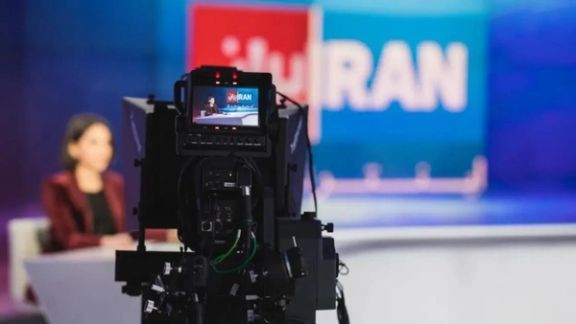
The British House of Commons is pushing to designate Iran’s Revolutionary Guard as a terrorist organization following a threat to the lives of two Iran International journalists.
"British-Iranian reporters who are now sited in the UK have been issued with credible information by the police that the Islamic Revolutionary Guard Corps threatens their lives. What more does IRGC have to do before we proscribe them in their entirety?" Conservative British MP Bob Blackman said in a House of Commons meeting on Tuesday.
In a statement on Monday, Volant Media -- the parent company of Iran International – said that two of their journalists have recently been notified of the threats. “The Metropolitan Police have now formally notified both journalists that these threats represent an imminent, credible and significant risk to their lives and those of their families. Other members of our staff have also been informed directly by the Metropolitan Police of separate threats," read the statement.
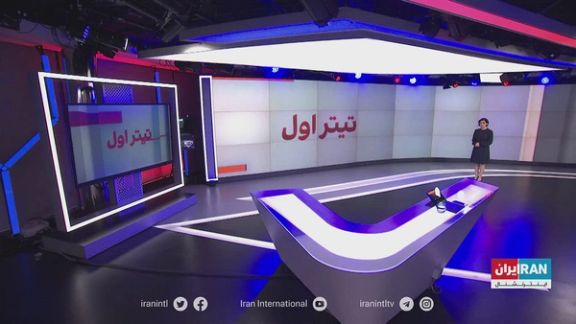
Urging the UK foreign ministry to ban the IRGC, Blackman said that “Thousands of Iranians have been arrested for just demonstrating their support for people who have been murdered. I have been supplied with a long list of people who have been sentenced to death just for protesting.”
Labor MP John Spellar said, "Today we've had members on both sides of the UK House raising this question to follow our allies in the US and to ban IRGC who are protectors of the Iranian cleric-fascist regime," throwing his party’s support for the designation.
David Rutley, the Parliamentary Under Secretary of State at the Foreign, Commonwealth and Development Office, also describing the death of Mahsa Amini – the 22-year-old girl who was killed in custody of hijab police and ignited the ongoing wave of protests – as well as all protesters killed standing up to the authorities as a “tragedy that shows the regime’s shocking disregard for the rights of the Iranian people.”
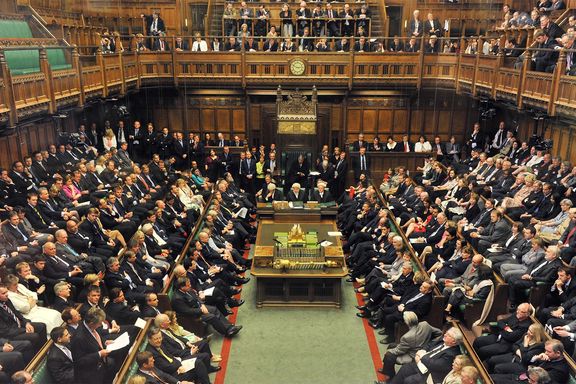
He added that the UK has robustly condemned Iran’s actions, including at the UN Human Rights Council, noting that the country has sanctioned the morality police and several other officials responsible for human rights violations. “The list of proscribed organizations is kept under constant review, but we do not routinely comment on whether an organization is or is not under consideration for proscription,” he said.
In reaction to the threats to the lives of Iran International’s journalists, Michelle Stanistreet, the general secretary of National Union of Journalists -- a trade union for journalists in the UK and Ireland – said, “It is shocking and outrageous that journalists carrying out their work in London are being targeted and facing credible death threats that are clearly emanating from the Iranian state."
"The stress and pressure this has placed journalists and their families under is despicable and is clearly designed to instill fear and have a chilling effect on media freedom,” she noted, expressing support and vowing to continue to press internationally and via the UN to force the Islamic Republic to desist.
Stressing the threat from the Islamic Republic, British Prime Minister Rishi Sunak pledged on Monday to improve relations with Persian Gulf Arab states beyond “defense cooperation.” Sunak met UAE president Mohammed bin Zayed al-Nahyan on the sidelines of the COP27 United Nations climate gathering in Egypt.

French President Emmanuel Macron says the threats posed by the Islamic Republic have gone beyond the Middle East and they must be confronted with.
In an interview with Al-Arabiya Macron said, “We must change the way we deal with the Iranian threat in the world,” adding that sanctions against the clerical government should not harm its people.
Macron, who had traveled to Egypt to participate in the COP27 United Nations climate gathering, said “We must cooperate in an organized manner to counter Iran's threats.”
Earlier, British Prime Minister Rishi Sunak on the sidelines of the same gathering considered the actions of the Islamic Republic to be the cause of instability in the Middle East region.
He said in a meeting with UAE president Mohammed bin Zayed al-Nahyan that the situation in Iran has become complicated with the repression of the protesters after death of Mahsa Amini in September.
Previously, Britain announced it had sanctioned the “morality police” because of “several decades of threats, arrests and violence” against Iranian women.
Also, on Monday, the German government announced that the European Union will decide on the inclusion of the Revolutionary Guard in the new package of sanctions against the Islamic Republic.
Ties between the Islamic Republic and the West are increasingly strained with Germany being among the first that started evacuating the families of the personnel of its embassy in Tehran and the teachers of German-run schools.
In mid-October, the EU sanctioned eleven Iranian individuals and four organizations for their role in the death of Mahsa Amini and the crackdown on the ongoing protests.
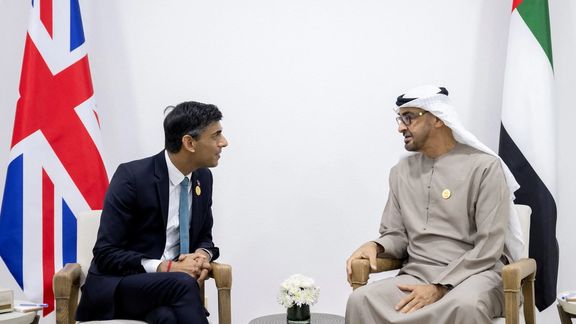
Rishi Sunak, the British prime minister, has pledged to improve relations with Persian Gulf Arab states beyond “defense cooperation” and stressed the threat from Iran.
Sunak met UAE president Mohammed bin Zayed al-Nahyan on the sidelines of the COP27 United Nations climate gathering in Egypt. Beleaguered over bullying allegations against a leading minister back in London, Sunak told Saudi-owned al-Arabiya that the United Kingdom was “lucky in its important and historical relations with the Gulf states.”
Britain has been a major regional arms supplier, with around 60 percent of its annual £110-billion ($126 billion) weapons exports going to the Persian Gulf, with Saudi Arabia, easily the region’s highest defense spender, taking the lion’s share. But a small amount has been going to the UAE, with only £887 million ($1.17 billion) to the UAE in the decade up to 2017, and France in December 2021 securing an €21-billion sale ($21 billion) to the UAE of advanced Rafale jets.
While the UAE and Iran have restored diplomatic relations since President Ebrahim Raisi took office in August 2020, Tehran-Riyadh talks in Baghdad have not yet led to the return of ambassadors. The Wall Street Journal recently reported Saudi warnings to the US of an imminent Iranian attack, although skeptics have noted this came just after Riyadh’s relations with President Joe Biden were strained by Saudi coordination with Russia over oil production cuts in the run-up to November 8 US Congressional elections.
‘Look who’s here! NASMAMs’
After months of lobbying in Washington, Ukraine said Monday it had received the first delivery of surface-to-air missiles that President Volodymyr Zelenskyy has claimed can combat drones supplied to Russia by Iran.
Defense Minister Oleksiy Reznikov said the NASAMS air defense systems would “significantly strengthen” its armed forces. “Look who’s here! NASAMS and Aspide air defense systems arrived in Ukraine!,” Reznikov tweeted. The Aspide is an Italian-made missile with a 40-km range.
A spokesman for the Germany government said Monday it was up to Kyiv to decide whether to open peace talks with Russia. Aside from €2-billion military aid to Ukraine, the German government has allocated $200 billion to cushion domestic and business consumers against energy price rises.
Iran acknowledged Saturday that it supplied drones to Russia, claiming this was before the current phase of the conflict began in February, but Kyiv has made great play of the supply in its lobbying efforts and recently named Iranian airlines it said had delivered drones. The US, France, Germany, and the United Kingdom have argued that Iran sending drones to Russia contravenes United Nations Security Council Resolution 2231, which endorsed the 2015 Iran nuclear deal, the JCPOA (Joint Comprehensive Plan of Action).
‘Not evolving in right direction’
Efforts to restore the JCPOA, which the US left in 2018 imposing ‘maximum pressure’ sanctions on Iran, have paused since the summer. Josep Borrell, foreign policy chief of the European Union, which has chaired JCPOA talks, said Monday that “positions between the parties” were “not converging yet,” meaning “things are not evolving in the right direction.”
Bilateral meetings between Iran and the US in the summer, chaired by the EU, and subsequent exchanges of messages, failed to resolve differences. Iran has sought ‘guarantees’ that it would be cushioned economically against the US again leaving the agreement. The atmosphere has also soured with the US and European states imposing additional sanctions on Iran, including against its ‘morality police’ over the death of a 22-year-old woman.
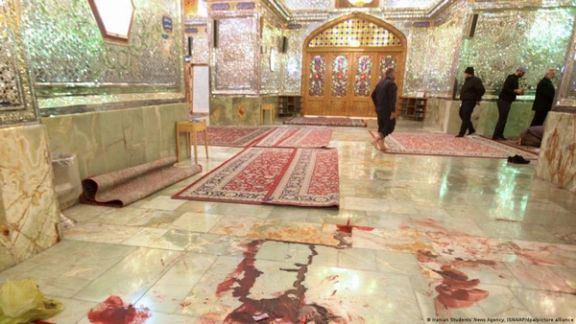
Iran’s intelligence ministry has announced the arrest of 26 people including foreigners on charges related to an attack on a Shia shrine October 26 that killed 15 people.
The ministry said in a statement on Monday, that these people were detained in different provinces as well as “at the eastern borders while fleeing the country.”
The ministry identified the assailant in Shahcheragh shrine as a Tajik citizen named Sobhan Komrooni with the nickname “Abu Aisha” and an Afghan person named Mohammed Ramez Rashidi as the “supporting element” of the operation.
Earlier, Esmail Mohebi, a top official at Fars governorate, announced the death of “the perpetrator of the attack on the shrine” who was injured and hospitalized in southern city of Shiraz.
In the statement, a citizen of the Republic of Azerbaijan was named as the “main element of directing and coordinating” the attack, who “flew from Heydar Aliyev International Airport in Baku and entered the country through Tehran’s Imam Khomeini Airport.”
“After arriving in Tehran, this person announced his presence to the coordinating element in the Republic of Azerbaijan and immediately contacted the network of foreign nationals of the ISIS to inform them about his presence in Tehran,” reads the statement.
The allegations by Iran cannot be confirmed by any independent source and the Republic of Azerbaijan has yet to react to the claim.
ISIS took responsibility for the attack on the Shahcheragh in Shiraz on October 26, but some questioned the Islamic Republic’s account saying it was staged by the regime itself to distract attention from nationwide protests.